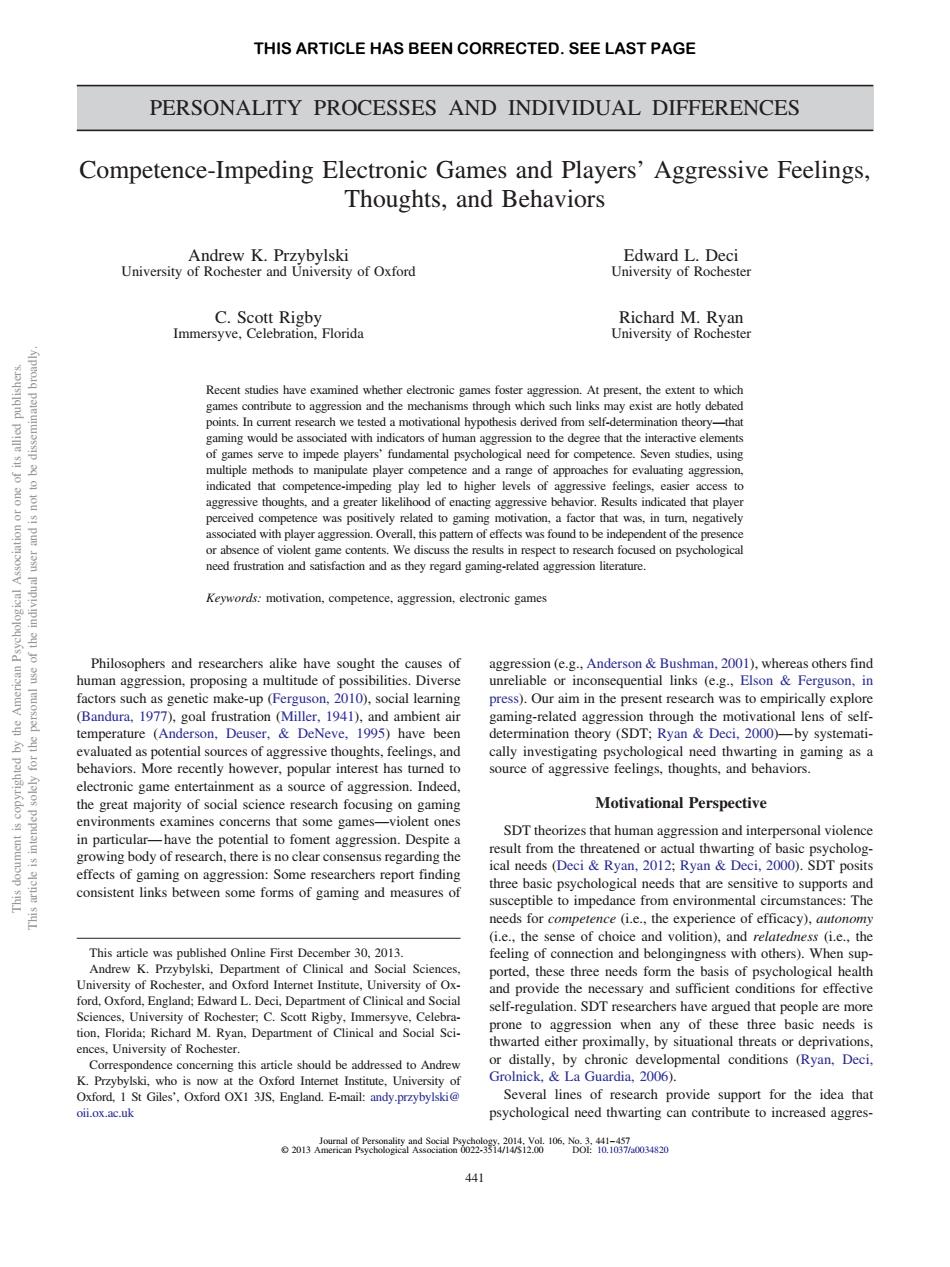正在加载图片...

THIS ARTICLE HAS BEEN CORRECTED.SEE LAST PAGE PERSONALITY PROCESSES AND INDIVIDUAL DIFFERENCES Competence-Impeding Electronic Games and Players'Aggressive Feelings Thoughts,and Behaviors Usny众 tahaPd RatdM points.In e aioetbeo s serve for ndicated that mpetenc Keyrd motivation,competence.aggression,electronic games and researchers alike ha an 2001)wher thers find human aggression,proposing a multitude of possibilities.Diverse inconscquential links (e.g Elson Ferguson.in s suc as ger make-up(Fe 0).social pres .0u Deuse .&DeNeve.1995)have bee nent as a source of aggression.Indeed. ncers that some sing on gaming Motivational Perspective me SDT theorizes that human aggression and inter onal violenc ned c effects of gaming on aggression:Some researchers report finding consistent links between some forms of gaming and measures of three basic psychological needs that are tosuppo ces:Ih ceds for (ie.the mher302013 wK. of Cli cal and S ocial Scie Oxford.England:Ed vard L.D nt of Clinical and S nd provide the i Grolnick.&La Guardia.2006). 4PERSONALITY PROCESSES AND INDIVIDUAL DIFFERENCES Competence-Impeding Electronic Games and Players’ Aggressive Feelings, Thoughts, and Behaviors Andrew K. Przybylski University of Rochester and University of Oxford Edward L. Deci University of Rochester C. Scott Rigby Immersyve, Celebration, Florida Richard M. Ryan University of Rochester Recent studies have examined whether electronic games foster aggression. At present, the extent to which games contribute to aggression and the mechanisms through which such links may exist are hotly debated points. In current research we tested a motivational hypothesis derived from self-determination theory—that gaming would be associated with indicators of human aggression to the degree that the interactive elements of games serve to impede players’ fundamental psychological need for competence. Seven studies, using multiple methods to manipulate player competence and a range of approaches for evaluating aggression, indicated that competence-impeding play led to higher levels of aggressive feelings, easier access to aggressive thoughts, and a greater likelihood of enacting aggressive behavior. Results indicated that player perceived competence was positively related to gaming motivation, a factor that was, in turn, negatively associated with player aggression. Overall, this pattern of effects was found to be independent of the presence or absence of violent game contents. We discuss the results in respect to research focused on psychological need frustration and satisfaction and as they regard gaming-related aggression literature. Keywords: motivation, competence, aggression, electronic games Philosophers and researchers alike have sought the causes of human aggression, proposing a multitude of possibilities. Diverse factors such as genetic make-up (Ferguson, 2010), social learning (Bandura, 1977), goal frustration (Miller, 1941), and ambient air temperature (Anderson, Deuser, & DeNeve, 1995) have been evaluated as potential sources of aggressive thoughts, feelings, and behaviors. More recently however, popular interest has turned to electronic game entertainment as a source of aggression. Indeed, the great majority of social science research focusing on gaming environments examines concerns that some games—violent ones in particular— have the potential to foment aggression. Despite a growing body of research, there is no clear consensus regarding the effects of gaming on aggression: Some researchers report finding consistent links between some forms of gaming and measures of aggression (e.g., Anderson & Bushman, 2001), whereas others find unreliable or inconsequential links (e.g., Elson & Ferguson, in press). Our aim in the present research was to empirically explore gaming-related aggression through the motivational lens of selfdetermination theory (SDT; Ryan & Deci, 2000)— by systematically investigating psychological need thwarting in gaming as a source of aggressive feelings, thoughts, and behaviors. Motivational Perspective SDT theorizes that human aggression and interpersonal violence result from the threatened or actual thwarting of basic psychological needs (Deci & Ryan, 2012; Ryan & Deci, 2000). SDT posits three basic psychological needs that are sensitive to supports and susceptible to impedance from environmental circumstances: The needs for competence (i.e., the experience of efficacy), autonomy (i.e., the sense of choice and volition), and relatedness (i.e., the feeling of connection and belongingness with others). When supported, these three needs form the basis of psychological health and provide the necessary and sufficient conditions for effective self-regulation. SDT researchers have argued that people are more prone to aggression when any of these three basic needs is thwarted either proximally, by situational threats or deprivations, or distally, by chronic developmental conditions (Ryan, Deci, Grolnick, & La Guardia, 2006). Several lines of research provide support for the idea that psychological need thwarting can contribute to increased aggresThis article was published Online First December 30, 2013. Andrew K. Przybylski, Department of Clinical and Social Sciences, University of Rochester, and Oxford Internet Institute, University of Oxford, Oxford, England; Edward L. Deci, Department of Clinical and Social Sciences, University of Rochester; C. Scott Rigby, Immersyve, Celebration, Florida; Richard M. Ryan, Department of Clinical and Social Sciences, University of Rochester. Correspondence concerning this article should be addressed to Andrew K. Przybylski, who is now at the Oxford Internet Institute, University of Oxford, 1 St Giles’, Oxford OX1 3JS, England. E-mail: andy.przybylski@ oii.ox.ac.uk This document is copyrighted by the American Psychological Association or one of its allied publishers. This article is intended solely for the personal use of the individual user and is not to be disseminated broadly. Journal of Personality and Social Psychology, 2014, Vol. 106, No. 3, 441– 457 © 2013 American Psychological Association 0022-3514/14/$12.00 DOI: 10.1037/a0034820 441 THIS ARTICLE HAS BEEN CORRECTED. SEE LAST PAGE